For content creators, digital marketers, service providers, online businesses, etc. SEO is a must to rank in Google’s search results. Without SEO, undoubtedly, a blog or website cannot get a good search rank. Therefore, one might lose a significant amount of organic web traffic as well as potential customers.

In this article, we will explain to you, why keyword implementation is important for SEO, what keyword difficulty is, and its impact on SEO score. Additionally, this article will give you a quick review of KeySearch, a keyword analyzer and SEO tool. Lastly, there will be a comparison between KeySearch and Ahrefs.
How To Increase SEO Score?
In order to enhance your SEO rating, certain essential tasks must be completed. Such as: writing quality content, improving user experience, optimizing site speed, adding appropriate tags, etc. Moreover, one has to keep posting quality content to retain the SEO score.
Furthermore, if your blog has pictures and videos then title them. Inasmuch metadata is also a component of SEO. One can raise their score by including keywords in the article and metadata. In this regard, an SEO tool might come in handy e.g. KeySearch for keyword analysis.
If you want to know more about SEO check out this article.
Keyword Utilization
Using keywords is one of the most crucial SEO components. Keywords can be the sole determinant that can get your website to the first page of Google search. Now one might wonder, “What are keywords?” The words and phrases people input into search engines to discover what they’re looking for are known as keywords. Actually, any word can be a keyword.
For example: if anyone is searching for a PC processor, CPU, Graphics card, GPU, PC case, monitor, etc. can be a keyword. Every topic has its own set of keywords. So, to improve SEO ranking, utilize these keywords.
Different Keywords and Their Attributes
All keywords are not the same. Some keywords are difficult others are easy. Keyword difficulty depends on search volume, rank, CPC (Cost Per Click), PPC (Pay Per Click), backlinks, traffic value, etc. These are the variables for keyword difficulty. The more difficult the keyword is the harder it gets a good SEO score.
Search volume means the number of queries for a search term in a search engine. Search rank indicates the position of a search term on a search result page. CPC is the amount an individual has to pay for each click on their ads. PPC is also the same. All these attributes determine the difficulty of a keyword.
A content creator should use low-difficulty keywords. Because keywords with a high difficulty level will not help the website rank high in SERPs (search engine result pages). For this reason, before implementing keywords, content creators should do a keyword analysis first.
The Need for an SEO Tool
Manually estimating a keyword’s difficulty is impossible. Thus a keyword analyzer is required. A keyword analyzer uses its bot to scrape search queries from popular search engines and shows us a keyword’s different kinds of dispositions in a perceivable manner.
Numerous tools are available for analyzing keywords, including KeySearch, Ahrefs, SemRush, Clearscope, and others. But if we consider price to the functionality of a keyword analyzer, KeySearch is one of the best. In fact, KeySearch offers a lot considering its subscription fees.
The Functionality of KeySearch
KeySearch is a powerful SEO tool that offers a comprehensive suite of features for keyword analysis. Let’s take a closer look at some of the key functionalities that make KeySearch a must-have for anyone looking to improve their website’s search engine rankings.
Keyword Difficulty Score
In this function, you can search for a keyword and find out its difficulty. KeySearch uses both colors and numbers to illustrate the difficulty.
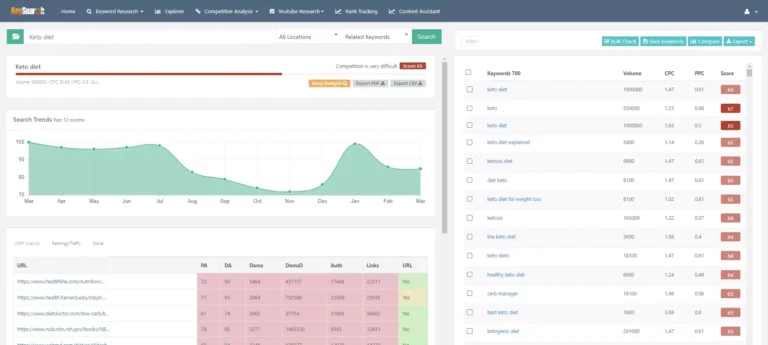
Light Blue Score: The Competition is Very Easy
Light Green Score: The Competition is Fairly Easy
Green Score: The Competition is Easy-Moderate
Yellow Score: The Competition is Moderate
Light Red Score: The Competition is Fairly Difficult
Red Score: The Competition is Very Difficult
Beneath that, you will find a panel titled ‘Search Engine Keyword Suggestions’, which displays keywords relevant to your content. These suggestions are beneficial to your SEO score.

The ‘Keyword Research’ menu contains a feature called ‘Quick Difficulty’, which enables the simultaneous determination of difficulties for up to 50 keywords.
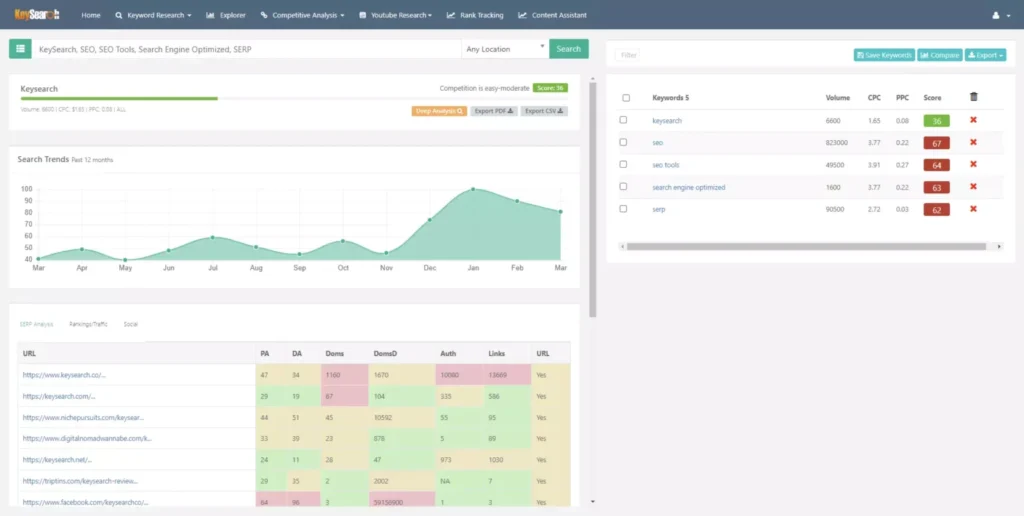
Search Volume
With KeySearch, it is possible to view the search volume of a constricted keyword during a particular timeframe. Users can set the timeframe using the filter function.
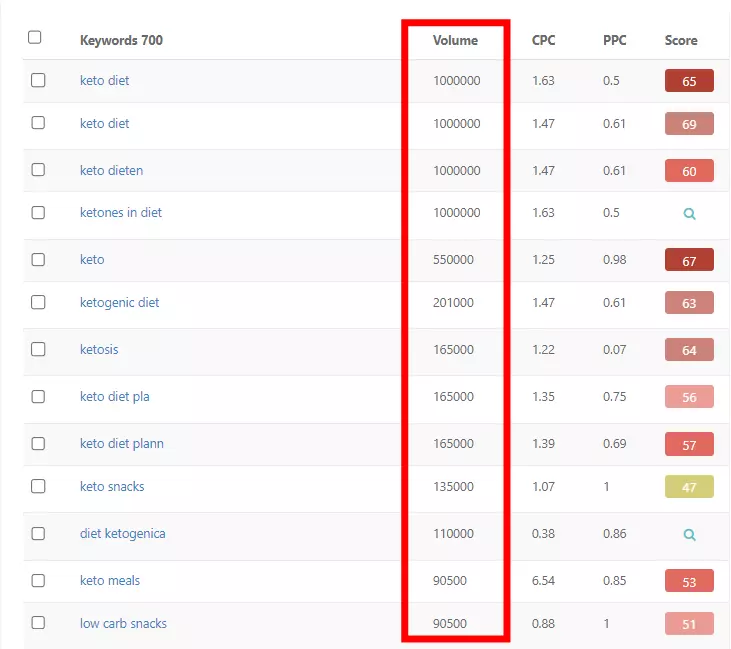
CPC & PPC
KeySearch can ascertain a keyword’s CPC & PPC. Users can use this metric to filter out keywords.
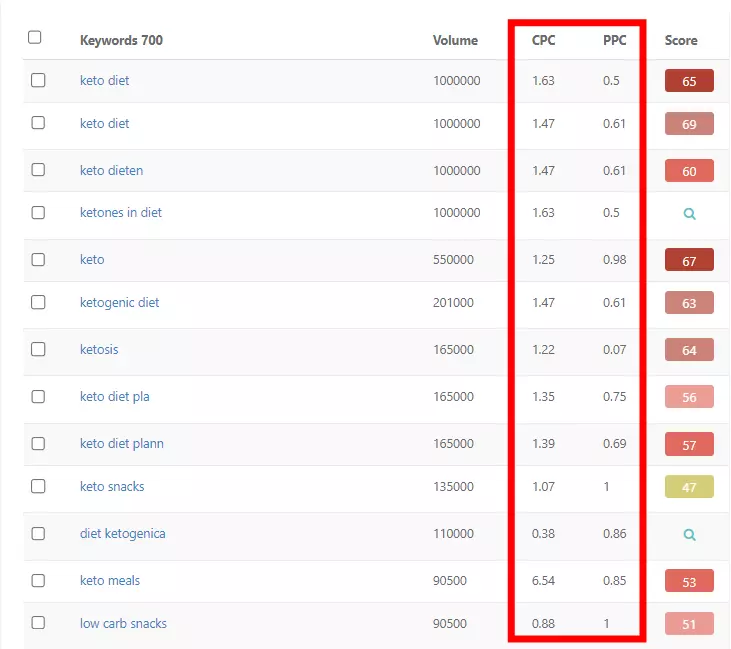
Organic Keywords
The function ‘Organic Keywords’ enables users to discern utilized keywords of a website. It can search through the entire domain and make a list of used keywords. Additionally, ‘Organic Keywords’ displays all attributes of a keyword.
This will help you to find out your competitor’s keywords. Moreover, using them could result in a favorable SEO rating.
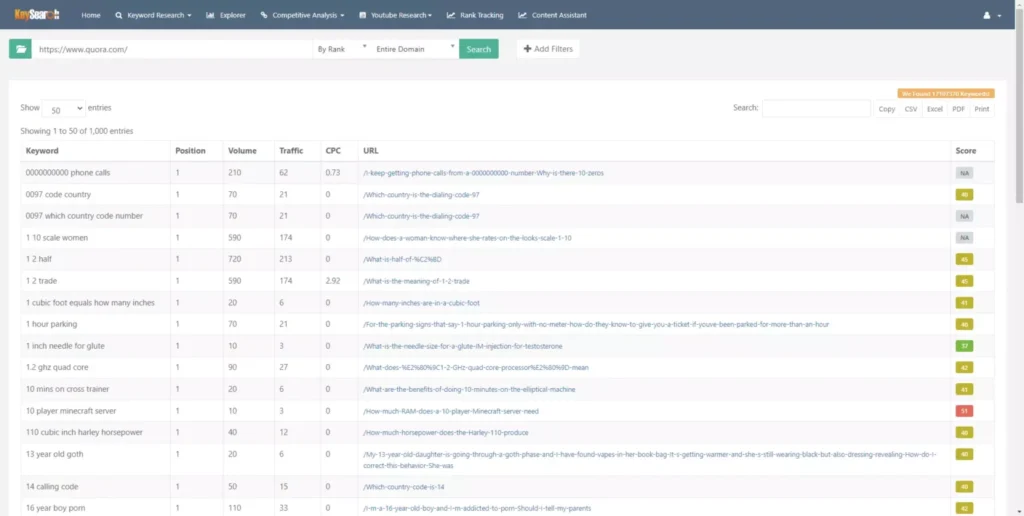
Backlink Checker
This function affords a summary of each backlink’s anchor text, extensity, domain strength, total number and other emplace.
Page Analyzer
KeySearch can analyze any web page and elucidate its attributes. As an illustration, enlisted keywords, their position, traffic, CPC, and URL.
URL Metrics
You can use this to enter numerous URLs and discern their high-level metrics.
Explorer
Explorer can show all kinds of metrics of a website. Including usual metrics, additionally, it exhibits DS (Directory Results Pages), links, domains, total organic keywords, total backlinks, top DS referring domains (i.e. search engines), etc.
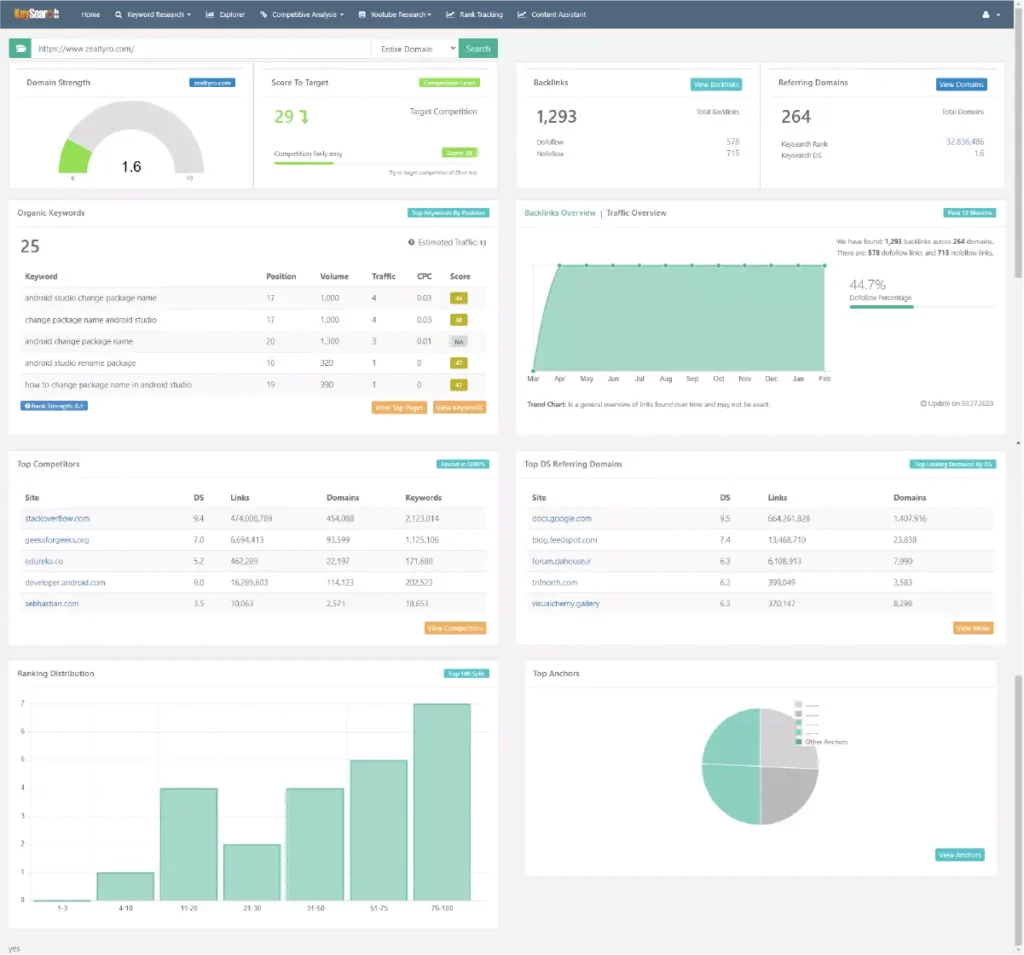
YouTube Keyword Research
YouTube Keyword Research tool can show keywords used on YouTube and their difficulty. In addition, there is a whole list of keywords used by other creators. It will assist you in coming up with more keywords. By utilizing this tool, one can SEO-optimize a video’s title, description, and tags.
Moz’s Page Authority & Domain Authority
Page Authority and Domain Authority is a scoring system developed by Moz that foretells how well a website will rank on a search engine result page. Moz is a renowned software for search engine optimization. Irrefutably, Moz’s PA & DA are very accurate and reliable.
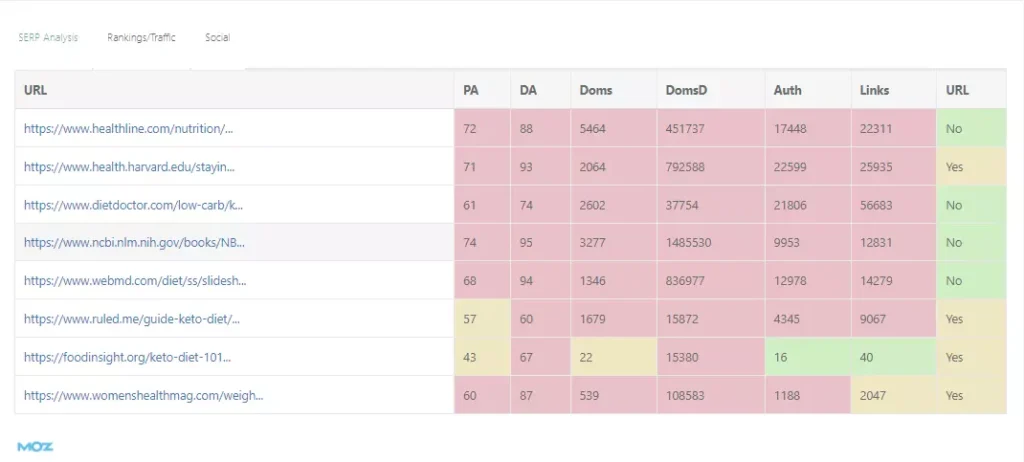
Keyword Tracker
A discreet keyword’s properties may change from time to time. For instance, a Christmas product has specific keywords related to Christmas. However, these keywords won’t be competitive after Christmas. Because their search volume will go down along with their SEO score.
To summarize, keywords do not hold their properties over time. They may fluctuate proportionally with their popularity. That is why, Keyword Tracker is extremely helpful in maintaining a high SEO rating.
Content Assistant
This feature will show you related keywords and their traits. It will suggest you must have keywords and phrases. These posited keywords are from the first page of Google. Therefore, implementing the keywords potentially get you to the first page of Google.
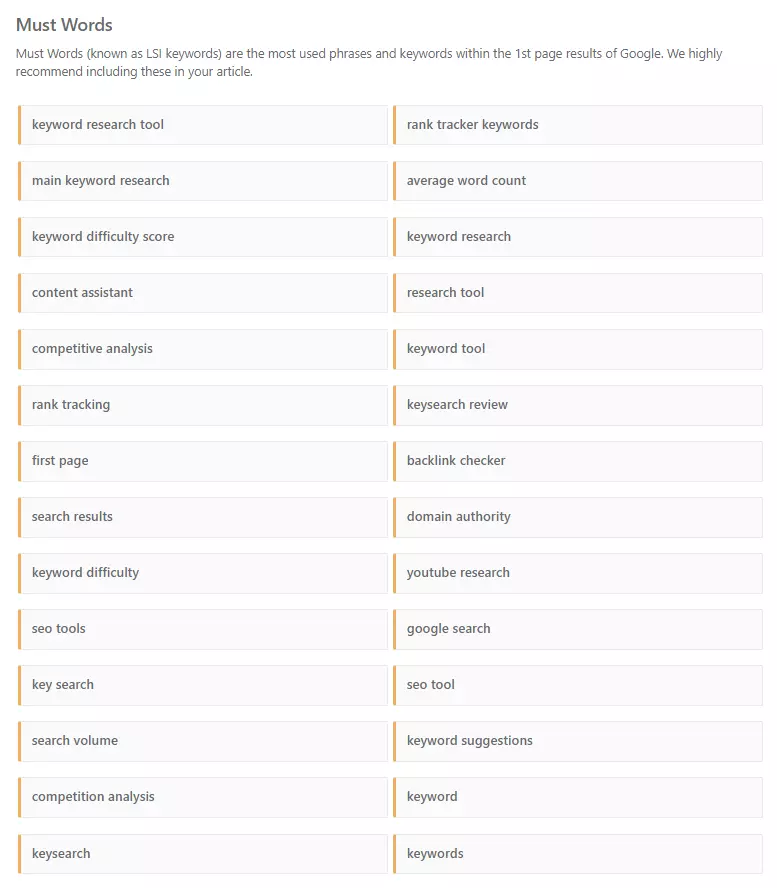
In addition, Content Assistant suggests popular questions which are advantageous for your content,
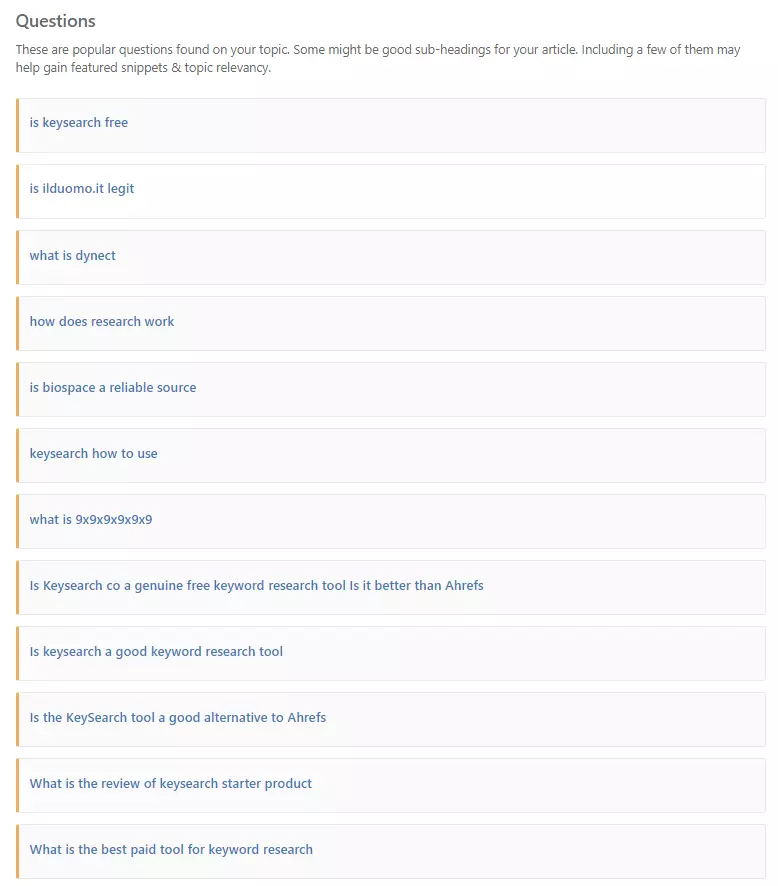
A Short Comparison Between KeySearch & Alternatives
There are a lot of alternatives for KeySearch. For SEO, the industry-standard service is Ahrefs. Like KeySearch, Ahrefs provides a vast array of tools for optimizing your website for search engines.
KeySearch and Ahrefs both excel at keyword analysis. Ahrefs has crawlers that work 24/7 and collect data. Ahrefs is not affiliated with any search engine rather they have a large keyword database. Ahrefs’ team claims that they have the largest index of live backlinks.
Cloudflare Radar catalogs Ahrefs’ bot in 6th position for good bots. Additionally, they collect clickstream data to ascertain keywords’ difficulty for SEO.
Likewise, KeySearch has a huge database for keywords. KeySearch has over 1 billion keywords spread out over 42 country-specific databases. These keywords indexed are by the KeySearch bot. Afterward, the keywords are processed, and their difficulties are determined. Undoubtedly, KeySearch has keywords for every kind of topic.
Here is a chart of the feature comparison between KeySearch and Ahrefs:
Conclusion
In the table above we can see that KeySearch is as good as Ahrefs, considering their feature set. However, KeySearch shines the most in pricing. KeySearch starts at only 17 dollars per month. On the other hand, The starting price for Ahrefs is 99 dollars which is not beginner friendly. Even though KeySearch and Ahrefs are very similar, for a beginner, KeySearch is a more viable option.
Again if we look at Semrush, another popular SEO tool, which starts at 120 dollars per month. In most cases, an entry-level content creator cannot subscribe to costly SEO services. But they need to search engine optimize their content to grow. There are other budget-friendly options however those are not as robust as KeySearch. Indeed, KeySearch’s functionalities are adequate to meet the requirements of intermediate or advanced content creators.
Since KeySearch includes all the necessary features and is priced very competitively, in my opinion, it is the best SEO tool, especially for beginner content creators.
Lastly, if you want to check out KeySearch click here.



